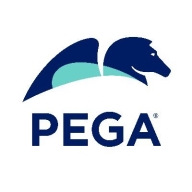

Pega Platform and OpenText AppWorks compete in the business process management category. Pega appears to have the upper hand due to its flexibility and broader integration capabilities, making it highly favored for enterprise-level solutions.
Features: Pega offers case management, integration services, and low-code/no-code capabilities. Its enterprise solutions include seamless cloud integration. OpenText AppWorks features robust integration and low-code development, with strong monitoring and dynamic case management to optimize processes.
Room for Improvement: Pega could enhance its cloud capabilities, technical support, and RPA integration while improving user experience and reducing costs. OpenText AppWorks needs better UI, improved mobile compatibility, and enhanced archival functions, along with a more competitive pricing structure.
Ease of Deployment and Customer Service: Pega provides on-premise and public cloud deployment options but faces inconsistent technical support, with noted response delays. OpenText AppWorks offers hybrid and cloud deployments and has generally good support, though it sometimes redirects issues to implementation teams.
Pricing and ROI: Pega's pricing is considered high, with licensing based on users or cases, making it suitable for larger enterprises. OpenText AppWorks offers more cost-effective solutions with varied licensing models, providing faster ROI with rapid prototyping and process optimization.


OpenText Appworks. AppWorks is OpenText's Enterprise Application Development and Management platform. It allows you to quickly and easily build purpose-specific apps for the enterprise using the web technologies such as HTML5, CSS3 and JavaScript. These apps can connect to the OpenText EIM Suite using RESTful API.
Pega Platform facilitates business process management, case management, and workflow automation for industries like banking, insurance, and healthcare. It supports digital transformation and customer service enhancements with its low-code capabilities and seamless integrations.
Pega Platform enables users to create efficient systems for case management, financial operations, and digital transformations. It provides tools for client onboarding, quoting, claims processing, customer experience improvements, and content management. Pega's low-code approach allows for the automation of complex processes, making it suitable for enterprises looking for adaptability and rapid deployment. While it offers strong real-time analytics and decision automation, users acknowledge challenges in user interface, integration, and performance aspects. High costs and a learning curve need attention, and enhancements in AI features and cloud services are desired.
What are the key features of Pega Platform?In banking, Pega Platform automates loan processing, accelerates customer onboarding, and manages compliance. Insurance companies benefit from streamlined claims processing and policy management. Healthcare sectors use the platform for patient engagement and care coordination, enabling organizations to adapt quickly to changing industry requirements.
We monitor all Business Process Management (BPM) reviews to prevent fraudulent reviews and keep review quality high. We do not post reviews by company employees or direct competitors. We validate each review for authenticity via cross-reference with LinkedIn, and personal follow-up with the reviewer when necessary.